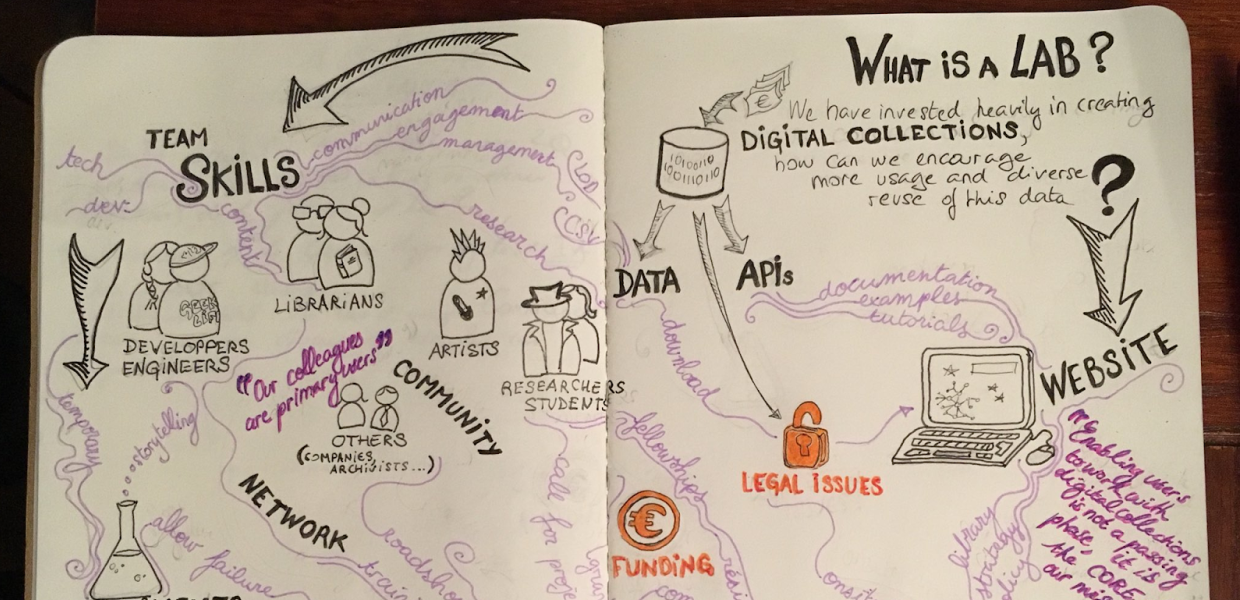Building library labs - what do they do and who are they for?
What do a library and a lab have in common? Well, not much, you may think at first. But the opposite is actually true. Clemens Neudecker tells us what a lab is in the context of a library, what activities it pursues and who it's for.

- Title:
- #buildlibrarylabs sketchnotes
- Creator:
- Emmanuelle Bermes
- Date:
- September 2018
- Institution:
- Bibliotheque national de France
- Country:
- France
- Copyright:
- CC BY
In recent years, labs have emerged across a growing number of libraries, first in the US, like at Harvard University or the New York Public Library, but quickly followed by first initiatives from Europe such as the British Library Labs or the National Library of the Netherlands' KB Lab.
This was also the agenda for the #buildlibrarylabs workshop at the British Library from 13-14 September 2018. Within the roughly 60 international participants - coming to London from as far as Washington and Alexandria - there was great variation in terms of both maturity of the lab they represented (some labs have been established for several years while others were still in the planning and preparation phase) and in the aims and objectives of those labs. However, there was also a high degree of agreement and overlap with regard to the motivations behind the labs.
Target 1: Open up cultural heritage data
One of the key objectives that all library labs seem to have in common is opening up large(r) quantities of cultural heritage data and making it easier to reuse these assets. This can be achieved in various ways: by building APIs, by the creation (and curation) of datasets, but even just providing a simple bulk download can go a long way - to quote from one of the working group discussions: 'APIs are nice, but downloads are awesome!'.
Target 2: Foster creative reuse
The reason you open up cultural heritage data is so that people can do things with it. Here are some wonderful examples that have come out of various labs:
-
Artist David Normal used British Library images as source material for his arresting artworks at Burning Man Festival (more at British Library Labs)
-
Researcher Melvin Wevers extracted advertisements from historical newspapers of the National Library of the Netherlands (more at KB-NL Lab Blog)
-
Chris Hutchings produced a musical response to Scottish 1962 Mathematics (Higher Grade) Second paper Section I exam (more at Re-sits)
-
Laura Wrubel from George Washington University Libraries used the Library of Congress API to make a tool that allows people to explore the LoC Digital Collections by colour (see also Library of Congress Labs Experiments)
- Tags lets you search the Danish webarchive by HTML-tags (more at KB-DK Labs)
The variety of creative and artistic use of the cultural heritage data shown here has been truly astonishing. But the aims of the labs staff were even higher - to quote from the workshop again: 'If the lab doesn’t bring down the infrastructure, you’re doing it wrong'.
Target 3: Development of staff and services
However, as a pre-event survey determined, internal staff came up second in terms of target audiences for the lab, directly after ‘researchers’. A shared objective amongst the labs is the development of internal staff, fostering digital skills and generally creating more engagement with digital collections across the whole organisation, thus resulting in incentives for more cross-departmental collaboration. This was another takeaway from the workshop: labs are about bringing the right people together and granting them the time and resources to come up with something new and special.
While a major issue with projects and experiments is their sustainability, there was a common understanding of labs as something that can stick around. Accordingly, it was good to hear that the British Library will be moving the (currently third-party funded) British Library Labs into permanent mode by integrating it with the regular activities of the Digital Scholarship Department. Also, Lily Knibbeler, Director General of the National Library of the Netherlands, who spoke to the group via video, was keen to mention that thanks to the successful work of the KB Lab team, the activities and services provided through the KB Lab have now become an essential part of the library’s service portfolio.
We are a community
Of course, Europeana Labs was present at the workshop as well. Bringing together the massive volume of open and reusable data available in Europeana Collections with the labs crowd should result in many more innovative ideas coming out of this.
To get involved in the #buildlibrarylabs community, you can contact Mahendra Mahey, the British Library Labs Manager who carefully put this event together, and maybe we’ll see you at the next workshop!

